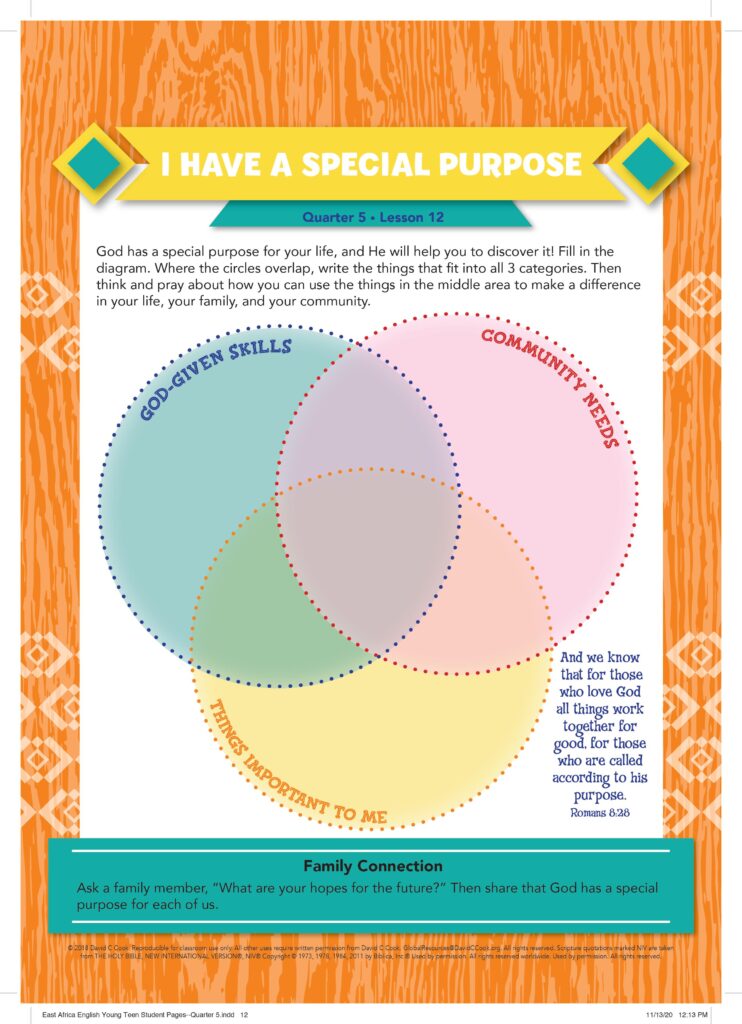During the lesson, the information for you to know is written in regular type, and what we suggest speaking or reading aloud to children is in bold. All resources for this lesson, including the Teacher Guide, Student Page, Family Connection Card, and other resources can be downloaded in a ZIP file by clicking on the following link:
In some lessons you will find "resource articles." These are articles written by experts from around the world to help equip you for your work with children and adolescents. Share them with parents or guardians if you consider it appropriate.
For if you remain silent at this time, relief and deliverance for the Jews will arise from another place, but you and your father’s family will perish. And who knows but that you have come to your royal position for such a time as this? For if you keep silent at this time, relief and deliverance will rise for the Jews from another place, but you and your father’s house will perish. And who knows whether you have not come to the kingdom for such a time as this?
Esther 4:14
God placed Esther in a unique position to do exactly what He had called her to do. The same can be said for Moses, Joseph, Mary the mother of Jesus, and the apostle Paul. The Bible is full of ordinary people whom God placed in unique positions to do extraordinary things to impact their communities and further His kingdom purposes. The same is true for you. Spend a few minutes thinking about the unique and extraordinary opportunities God has given you.
Think about your circumstances: where you live, the people you know, your talents, and your personality. No one else in the world is exactly like you. And no one else in the world is exactly the right person to do what God has called you to do. As you prepare for this lesson, ask God to reveal to you more of His plan for your life. He can and will use you in big and little ways to work in the hearts and lives of the teens you teach. Your life will be a living example of how God can use each person to help the community. Pray that He will continue to help you see new and unique ways to use your gifts and talents in His ministry for His glory.
Encourage the teens to ask a family member, “What are your hopes for the future?” They can then share that God has a special purpose for each of us.
Teacher Tip: If possible, email or text the Family Connection Card to the families of your students.
Have the students line up in order from tallest to shortest. Then divide the line in half. Have the taller half of the class stand on 1 side of your area and the shorter half stand on the other side. Explain that you will ask some questions and the groups should shout their answers.
Have all the young women stand on 1 side of the area and all the young men stand on the other side.
Tell the students to sit down.
God notices each person He created. He notices you. You matter to Him. During Bible times, people brought animals to the temple and sacrificed them to God. Rich people would bring valuable animals such as sheep, goats, or cattle. Poor people would bring birds, often sparrows. Sparrows are common birds that were cheap and unimportant. Let’s read a Bible passage that talks about sparrows.
If possible, have a teen read Luke 12:6–7 aloud from the Bible.
Are not five sparrows sold for two pennies? Yet not one of them is forgotten by God. Indeed, the very hairs of your head are all numbered. Don’t be afraid; you are worth more than many sparrows.
Luke 12:6–7
Give students about 1 minute to share with their partners. Then call on 2–3 students to share their answers with the class. Then have students answer the next 2 questions as a class.
Students may answer that God notices the sparrows, and He notices everything about us.
Students may answer that they are special to God. God knows everything about them. He even knows how many hairs they have on their heads. They are very valuable to God.
Today we will hear a true story about a young woman in the Bible named Esther. Many things in her life were very ordinary, and some were even bad. But God had a special plan for her life, and He put her in a unique position to help others. The same is true for you, though God’s plan for you is different. No matter what has happened in your life, you are special, and God has a special purpose for your life.
If you are using the images from The Action Bible, show them as you tell the story.
Almost a hundred years before Esther, the Babylonians defeated the Jewish people. They took many of the Jewish people captive as slaves. The Persians later defeated the Babylonians and inherited the captive Jewish people.
Esther was an orphan girl living in Persia. Her uncle, Mordecai, cared for her. As an orphan, Esther may not have seemed important or special.
The Persians worshipped many gods, but the Jewish people worshipped only the One True God. Because Esther was Jewish, she was just one of many people living as captives in Persia. So she may not have seemed important or special.
Pause for a minute for the teens to think about ways they relate to Esther.
During this time, the king of Persia became angry with the queen and decided to look for a new queen. He called for all the beautiful young women in the land to be brought to the palace and trained for a year. He would then choose a new queen from among them. Esther was taken to the palace and lived away from her uncle. She and the other young women prepared for the time they would meet the king. Let’s read what the Bible says about when Esther met the king.
She was taken to King Xerxes … Now the king was attracted to Esther more than to any of the other women, and she won his favor and approval more than any of the other virgins. So he set a royal crown on her head and made her queen.
Esther 2:16–17
If possible, show the students the images from The Action Bible.

As queen, Esther had all of her needs met. Many people probably thought she was important and special now. But she was expected to obey whatever the king said, including having sexual relations with him whenever he wanted. Esther was not a wife for the king in the way God intended for Christian marriage. If Esther did not please the king, he could have her killed or banished as he did with the queen before Esther.
Some time later, a powerful man named Haman convinced the king to make a law that would allow Haman to kill all the Jews in Persia. Remember, the king did not know that Esther was Jewish.
Esther’s uncle, Mordecai, told Esther to beg the king for mercy to save her Jewish people. But Esther was afraid because no one was allowed to talk to the king unless invited. Going into the king’s presence uninvited could cause a person to be killed! Esther was also afraid to let the king know that she was Jewish.

Listen to the advice that Mordecai gave her.
Have a student read Esther 4:14 aloud from the Bible.
For if you remain silent at this time, relief and deliverance for the Jews will arise from another place, but you and your father’s family will perish. And who knows but that you have come to your royal position for such a time as this?
Esther 4:14
Students may answer that if Esther did not talk to the king, God would still save His people. He would use someone else to save them.
Students may answer that God put Esther in position as queen of Persia at this time in history so that she could talk to the king and save the Jews. This may have been God’s special purpose for her.
Esther told Mordecai and the rest of the Jews to seek God with her. With God’s wisdom, Esther came up with a plan. Esther asked to see the king and invited him to a banquet. Because she had found favour with him, he attended her banquet. He was pleased with Esther and asked her what he could do for her. She revealed to the king that she was Jewish and asked him to save her people. Listen to what Esther said to him.
“If I have found favor with you, Your Majesty, and if it pleases you, grant me my life—this is my petition. And spare my people—this is my request. For I and my people have been sold to be destroyed, killed and annihilated. If we had merely been sold as male and female slaves, I would have kept quiet, because no such distress would justify disturbing the king.”“If I have found favor in your sight, O king, and if it please the king, let my life be granted me for my wish, and my people for my request. For we have been sold, I and my people, to be destroyed, to be killed, and to be annihilated. If we had been sold merely as slaves, men and women, I would have been silent, for our affliction is not to be compared with the loss to the king.”
Esther 7:3–4

She asked God for wisdom. She treated the king with respect by hosting a banquet and by speaking to him respectfully. She honoured his position of authority.
The king could not change the law because, in Persia, even the king had to obey the law. But he did make a law that the Jews could defend themselves. And with God’s help, they did. Many of the people who had tried to kill the Jews died, including Haman. Esther’s uncle, Mordecai, became an important advisor to the king. Esther was special to God and He used her to help her people.
Bad things had happened to Esther. She was an orphan. She was a queen who had to please her king whenever he wanted. Her life and the lives of those she cared about were threatened. Though God did not cause these bad things to happen to Esther, He did use her experiences for good. In spite of her difficult situation, Esther trusted God and He worked in her life for His purposes.
There was only 1 Esther, and God had a purpose for her. He had a plan for her to help her community. Similarly, there is only 1 you, and God has a purpose for you. Here are some things we can learn from Esther’s life.
Esther listened to godly advice. When she learned about the plan to kill all the Jews, Esther did not make the decision on her own. She asked for advice from her uncle Mordecai, whom she knew to be a godly and wise man. Godly advice will always align with what is in the Bible.
Esther used her God-given skills and talents. Besides being beautiful, she was intelligent. She knew how to approach the king in a way that would gain his favour instead of make him angry. Esther was also courageous. She was willing to risk her life to do what God had called her to do.
Esther was concerned for others. She knew that her purpose was not just to protect her own life. It was to protect the lives of all of the Jewish people. When God reveals His purpose in our lives, it is never selfish. God works for our good and for the good of others.
Whoever you are, you are important to God. Whatever your talents are, God can use them to make a difference for others in your community and your world. He has a special purpose for your life. Even if someone has hurt you or mistreated you, in God’s eyes you are beautiful and honourable. Your life is filled with purpose. With God’s help, you can discover what that is. Listen to what God said to His people through the prophet Jeremiah.
“For I know the plans I have for you,” declares the Lord, “plans to prosper you and not to harm you, plans to give you hope and a future.”
Jeremiah 29:11
Allow 2–3 students to share their thoughts.
Allow students to recall the answers from the lesson.
Read the following questions to the students and pause between the questions. The students will not answer them aloud. Instead, they will use their fingers to write the answers on the palms of their hands.
Optional: If you are using the Student Pages, the students can do this activity on them.

Now place the hand that you wrote on over your heart. The words you wrote can help you to discover God’s special purpose for you. When you follow God’s direction, you will be surprised at what He will do with your life!
Have a student read the Romans 8:28 aloud from the Bible. Show the Memory Verse poster if you are using it.
And we know that in all things God works for the good of those who love him, who have been called according to his purpose.
Romans 8:28

This verse promises that God works for the good of those who love Him. He can use the things we have learned from our good and bad experiences. He can use the things we like about ourselves and the things we do not like. He can take all the things that have happened in our lives and use them for good when we follow His purpose.
With your hand over your heart, pray or think about your special purpose. You may have an idea of something you can do to help others and bring glory to God. Pray about that. You may not yet have an idea of what God’s special purpose for you is. Pray about that. You may not be sure you want the future God has planned for you. Talk to Him about that.
Give the students 1–2 minutes to pray. Then have them form a circle. Invite the students to go around the circle and share the special purposes they thought of. If they choose not to share, they can say, “Pass.” Remind them that they are special and God has special purposes for each of them, even if they do not know them yet.
Close class by praying a blessing based on Romans 8:28:
Blessing: May you rest in the knowledge that God will work all things together for good in your life. May you find God’s purpose for your life, and may you have hope in His special plan for your future.
Lead the teens in singing this quarter’s song, if possible.
Life on Life ©2020 David C Cook. Reproducible for home or classroom use only. All other uses require written permission from David C Cook [email protected]. All rights reserved.